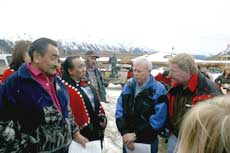
The Iskut band has joined the Telegraph Creek elders' protest against development on traditional Tahltan territory in northern British Columbia. The Iskut band also quit the pro-development Tahltan Tribal Council that promised to fast track several mining projects and an unconventional gas field.
Dressed in traditional regalia, a group of Iskut elders confronted representatives of Shell Canada on March 2. Led by Iskut Chief Louis Louie, they told Shell that the Iskut First Nations Band Council would enforce the moratorium adopted by the Telegraph Creek elders in mid-February.
"There will be no business on Tahltan lands in respects to resource development due to the moratorium that was imposed by our hereditary elders council," Chief Louie told the Shell representatives.
Iskut is the second largest Tahltan community, and the only village other than Telegraph Creek to have an elected chief. The Iskut endorsement suggests that support for the Telegraph Creek elders is widespread among the estimated 1,500 Tahltan who live in northern B.C. Likewise, the participation of Chief Louie -- who had not previously objected to these development plans -- suggests a sea change among Tahltan leaders.
Deal offered 'certainty'
"Our land is our kitchen," elder James Dennis told the Shell team. “When you bring your poison onto our land you are poisoning our kitchen.” Dennis’ family territory is within the Klappan-Groundhog Coalfields from which Shell Canada hopes to extract a form of gas called coalbed methane.
Upon learning that the public meetings they’d come to attend were cancelled, the Shell delegation left Iskut. “A group of elders presented us with their moratorium, and invited us to leave,” said Shell Canada spokesman Jeff Mann. “We respected their wishes.”
“This reinforced for us the need to engage with the broader community,” Mann continued. “We are aware there is an internal process taking place in the Tahltan community. The most respectful thing we can do is to allow the Tahltan to work through these issues on their own.”
The Iskut band council withdrew from the Tahltan Central Council the following day. Like the seizure of the band office at Telegraph Creek, the Iskut are protesting the council’s November 2004 deal with the province under which the council would receive $250,000 a year to smooth the way for future mining, forestry and hydro projects.
Shell Canada’s Mount Klappan gas field was one of several projects promised “certainty” by that deal. Shell holds exclusive exploration rights to look for oil and gas in a 400 hectare tenure within the Bowser Basin, which holds an estimated 9 per cent of B.C.’s coalbed methane potential. The company drilled core samples at three sites in 2004, and ran a seismic line along an existing railbed.
“What we learned in 2004 is that we need to learn more,” Mann said. “We will have to do some more consultation to identify if there is a way to more forward with further exploration.”
Also promised fast-track treatment under the controversial November deal were NovaGold Resources' Galore Creek gold and copper mine, bcMetals' Red Chris gold and silver mine, Fortune Minerals' Mount Klappan open-pit coal mine, and Coast Mountain Power's Forest Kerr hydroelectric dam.
Moratorium legal?
The elders claim the November 2004 memorandum of understanding was illegally created, and are preparing to challenge it in court. “All agreements negotiated with industry and government to date… are hereby declared void,” the elders’ moratorium declaration asserts, adding: “We will defend in any way necessary our rights and freedoms, to be self-determining.”
The occupation of the Telegraph Creek band office --- now entering its eighth week --- has remained peaceful thus far, despite allegations of intimidation and harassment. The Tahltan elders --- in their sixties, seventies and eighties --- took over the two-storey administration building on Jan. 17.
The Tahltan protest is one of several current First Nations protests against the pace of development in rural B.C. Other ongoing conflicts include a mining moratorium near Fort St. James and a logging blockage in Kingcome Inlet.
Iskut is located on Hwy. 37 about 1,000 kilometres northwest of Vancouver. Telegraph Creek is seated on the Stikine River at about the same latitude.
Monte Paulsen is a contributing editor to The Tyee.
![]()















Tyee Commenting Guidelines
Comments that violate guidelines risk being deleted, and violations may result in a temporary or permanent user ban. Maintain the spirit of good conversation to stay in the discussion.
*Please note The Tyee is not a forum for spreading misinformation about COVID-19, denying its existence or minimizing its risk to public health.
Do:
Do not: